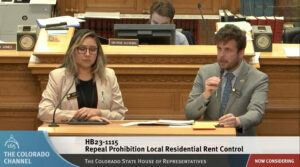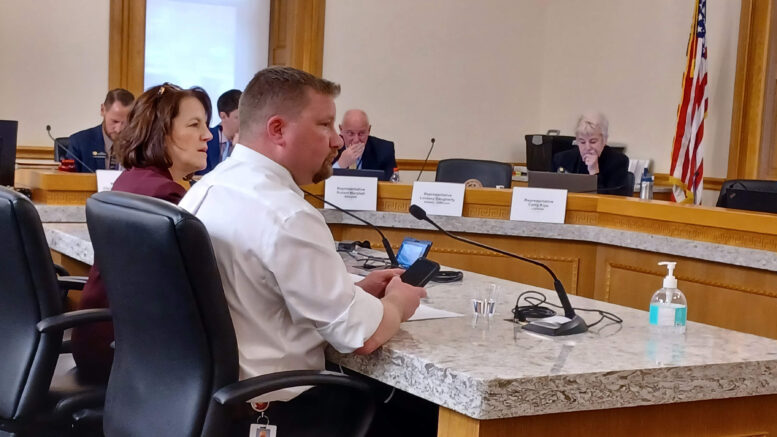As Colorado legislators seek solutions to the state’s affordable-housing crisis, the contrast between two proposals that played out Monday at the Capitol shows how wide a gulf there is between market- and government-centered proposals.
In the morning, the House, as expected, passed HB 1115, which would repeal the state’s 42-year-old ban on local laws that allow for rent control or rent stabilization. Approved on a 40-24 vote, with five Democrats joining all the chamber’s Republicans in opposing it, the high-profile bill faces a perilous path through the Senate, where one prominent Democrat predicted last week that it won’t make it out of the chamber.
In the afternoon, meanwhile, the Senate Finance Committee advanced with a bipartisan 9-2 vote HB 1189, which takes a very different approach to helping workers get into residences. Sponsored by Democratic Rep. Shannon Bird of Westminster and Republican Rep. Ron Weinberg of Loveland, the bill offers a 5% tax credit to employers who contribute as much as $100,000 a year to funds that will help their workers purchase a home.
The rent-stabilization bill, which sponsoring Democratic Reps. Javier Mabrey of Denver and Elizabeth Velasco of Glenwood Springs emphasize is just an option for local governments to come up with innovative ways to attack rising housing prices, produced lengthy ideological debates over three days in committee and on the House floor. Opponents such as landlord groups and Republicans argued that other cities with similar policies have seen a slowdown in new construction and a pullback in apartment improvements as a result, while Mabrey insisted more tools are needed because “the market for rent is not fair right now.”
HB 1189, meanwhile, promises not a panacea but an incentive for employers to consider one more option that could differentiate themselves in today’s competitive recruitment and retention landscape and could help younger workers build equity for homes. Pressed on whether a 5% tax credit actually could create new behavior among employers who can offer home-buying help already, Upstate Colorado Economic Development President & CEO Rich Werner said that even that level of financial aid can incentivize decisions, much like enterprise-zone tax credits the state offers to push business to underdeveloped areas.
“We have an opportunity here to change the narrative, to create a program that becomes normalized along with your 401(k) and along with your health benefits,” Werner said in predicting wide usage of the new tool if it is approved. “You will begin to normalize this activity, and I can’t think of a better way to do this than to create this public-private partnership.”
To be sure, the debate on how to attack the state’s lack of affordable dwellings — housing costs are 15% above the national average as the medium home price in Colorado rose to $569,000 last year, Colorado Association of Realtors lobbyist Jason Hopfer noted — is not an either/or situation regarding these two bills. Gov. Polis is working with a wide-ranging coalition to come up with a proposal that would reduce local regulatory burdens to speed construction of multi-family development along transit lines and allow property owners to put up accessory dwelling units more easily, for example.
But the different reactions to HB 1189 and HB 1115 show how certain solutions boosting government control are being seen as divisive during a session focused on affordability while other solutions offering government-based carrots are crossing ideological lines.
HB 1115 opponents argued that history in other rent-control cities has shown the practice removes incentives for apartment or rental-home owners to make upgrades to properties when they can’t boost rents to recover their investment, and that it’s led to reductions in new construction. Rep. Ken DeGraaf, R-Colorado Springs, cited a paper from the National Apartment Association predicting, based on modeling, that a rent-control law in Denver would lead to 779 fewer units being constructed per year, a $4.5 million decrease in maintenance spending annually and a $462 million loss in the value of property that would decrease tax revenues.

Colorado state Rep. Javier Mabrey (right) describes House Bill 1115 to the House chamber on Friday as co-sponsoring Rep. Elizabeth Velasco (left) listens to him discuss the rent-stabilization bill.
Mabrey countered that some cities with rent-stabilization laws, such as Washington D.C. and Jersey City, recorded higher per-capita additions of housing units from 2010-18 than many Denver suburbs did. To try to quiet critics, he and Velasco added an amendment banning local governments from imposing rent-stabilization measures on any property less than 15 years old and barring cities and counties from limiting rent increases to less than 3% plus the increase in the consumer price index and the increase in the average assessment values.
“This bill doesn’t implement a policy. It opens the door to more, better and creative solutions from local communities,” Velasco said. “High rent is a critical issue.”
Were HB 1115 to pass, it remains to be seen how much local governments will employ it.
At a mayoral forum hosted by Denver Metro Association of Realtors Thursday (and moderated by this writer), five of the seven invited candidates — Kelly Brough, Chris Hansen, Mike Johnston, Andy Rougeot and Kwame Spearman — said they would not use new rent-control tools, while Leslie Herod and Debbie Ortega said they may use them in limited ways. Hansen pointed to the history of problems with rent control in other cities and predicted that Gov. Jared Polis won’t get the chance to decide whether to sign the bill into law.
“I do not see this bill making it out of the Senate,” said Hansen, a senator whose Democratic Party holds a 23-12 edge over Republicans in the chamber. “I think we have had much better success with income-qualified requirements for certain properties.”
There was far greater unanimity around the idea of offering tax credits to push employers to help workers buy homes.
Meghan Dollar, senior vice president of governmental affairs for the Colorado Chamber of Commerce, told the House Finance Committee that housing affordability has become a “top-two” issue for her organization and other business groups and that any bills that create more recruitment and retention tools will help in that area.
Charles Allison-Godfrey — staff attorney for Elevation Community Land Trust, which develops and preserves housing for lower-income workers — lauded the bill for limiting the tax credits to the purchase of primary residences rather than second homes, saying it will target workers who need the most help.
Rep. Bob Marshall, D-Highlands Ranch, said he worried that the bill still would skew toward employers helping C-level workers and those of higher-income levels purchase homes. But Werner said he believes employers would more likely contribute smaller amounts that would benefit workers trying to build up a nest eggs.
Marshall and Rep. Chris DeGruy-Kennedy, D-Lakewood, voted against HB 1189, with DeGruy-Kennedy saying he was not convinced that the bill would induce behavior that isn’t already happening. But the majority of Democrats and Republicans on the committee backed the measure, which heads next to the House Appropriations Committee.
“There is no silver-bullet solution to our housing crisis,” Allison-Godfrey said. “There are, however, a wide array of solutions that can move the needle.”
